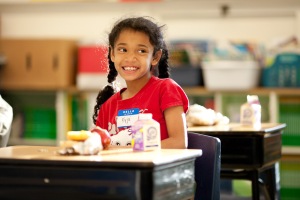
Michele Murphy shows of G.W. Carver’s new school pantry, sponsored by the Harry K Foundation. In addition to backpacks, district families may also utilize the pantry.
By Gwen Guerke, Communications Coordinator
Many of the participants in the Food Bank of Delaware’s Backpack Program are in elementary and middle school.
However, at the G.W. Carver Center in Frankford, there are 58 high school students enrolled in the Advanced Preliterate English Language Learners (APELL) program who are grateful to receive the weekend supply of food.
Many of them work in addition to going to school, said Michele Murphy, Parent Center Director. “They are some of the happiest kids. They want to learn. They are not greedy and appreciate whatever they are given.”
Some, she said, work in the poultry-processing plant in addition to attending school.
“It’s like giving them a million dollars in cash,” she said. Even though the Backpack Program is geared toward elementary-age students, the food makes a difference in these students’ lives.
The Backpack Program, now in its third week here, is distributed on Fridays.
“It’s inconspicuous,” said Mrs. Murphy, adding that the shelf-stable food packed in plastic bags is handed out in the three classrooms where the students are learning English, math and science.
“It’s better than nothing, and it’s a little variety,” she said.
“The students are thrilled. It’s been successful beyond our expectations. Who knows, the backpacks may keep them here.”
Mrs. Murphy said the students are not the only ones who benefit from the backpacks.
“The teachers are also very appreciative. They could tell the students need some nourishment over the weekend. They feel like Santa Claus,” she added.
Teacher Lori Ott agrees the backpacks are an important part of the students’ educational experiences.
“They appreciate it, and they are ready for them,” she said.
To learn more about the Backpack Program, please click here.

 By Kim Turner, Communications Director
By Kim Turner, Communications Director By Gwen Guerke, Communications Coordinator
By Gwen Guerke, Communications Coordinator By Kim Turner, Communications Director
By Kim Turner, Communications Director Thanks to a generous donation from the Harry K. Foundation, anti-hunger advocates officially cut the ribbon on the new school pantry at the G.W. Carver Educational Center this morning.
Thanks to a generous donation from the Harry K. Foundation, anti-hunger advocates officially cut the ribbon on the new school pantry at the G.W. Carver Educational Center this morning.





















 By Ashley Michini, Policy and Advocacy Coordinator
By Ashley Michini, Policy and Advocacy Coordinator True or False: The only place students eat school breakfast is in the cafeteria.
True or False: The only place students eat school breakfast is in the cafeteria.



 By Charlotte McGarry, Programs Director
By Charlotte McGarry, Programs Director